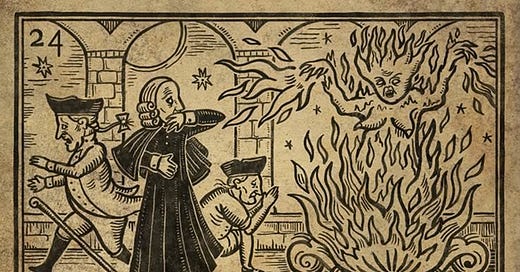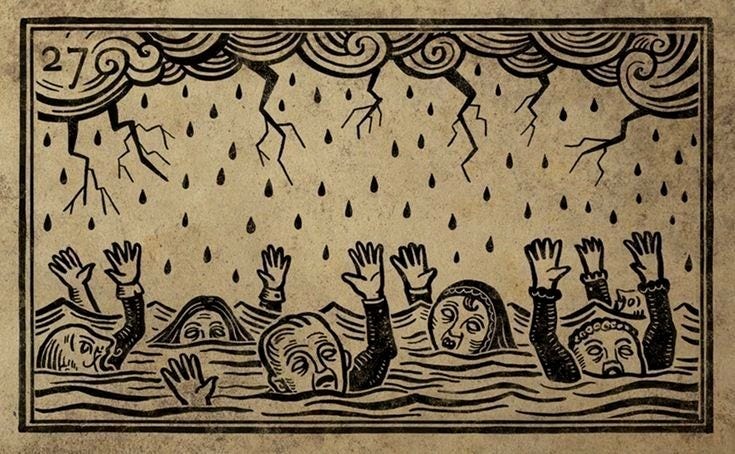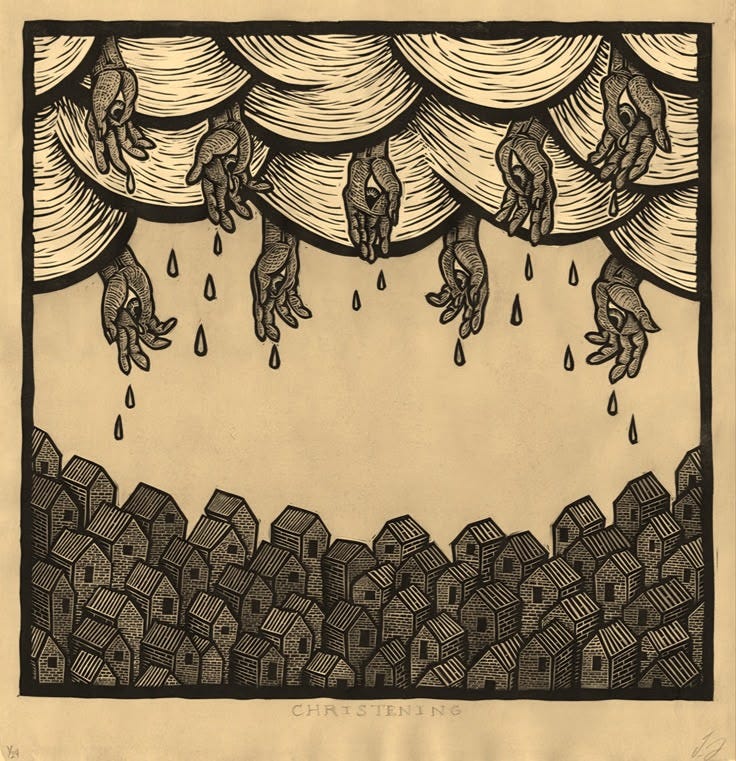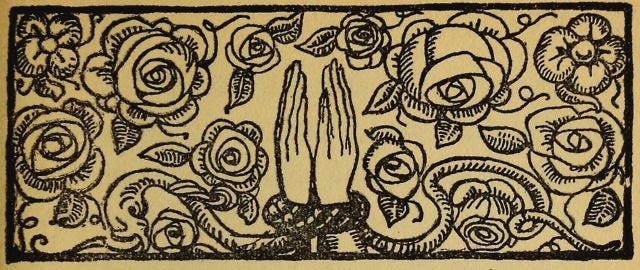Fear: The Many-Faced God.
Trump's tactics of suppressing knowledge and fostering Christian nationalism echoes the colonial history of control.
As the prominent story goes,
24 women were burnt in the Salem witch trials, (as well as 1 man); accused of practicing witchcraft as wardens of the devil, but of course, “the real witches were too clever to get caught” or so I heard somewhere,
probably Reddit.
Of course we know by now that most of the women accused of witchcraft in Salem weren’t burnt at the stake but rather hung. More importantly though, we’ve learnt how many of the women put to the stake during the Salem witch trials weren’t guilty of possessing anything more than a wealth of knowledge in the context of a puritanical culture laced with fearful lies about a damned female population as descendents of their common ancestor and evil temptress Eve, and imbued heavily with traditionalism and misogyny.
“Women who deviated from societal expectations, such as being independent, outspoken, or having unusual behaviour, were particularly vulnerable to accusations of witchcraft. These women were often seen as threats to the patriarchal order and were punished for challenging traditional gender roles.”
Source: Open Access Government.org “They weren’t witches; they were women: The witch-hunts and their repercussions”
What happened in Salem not only reflected a fear of the ‘other’, with that ‘other’ being women who were educated, outcast, practiced alternative healing, or were ‘disobedient’, but also established a way for a religious authority to maintain control over societal norms, morality, and knowledge. Educated women have known for centuries the threat they posed to hegemonic masculinity, the fear they feel, as well as subsequent attempts to reinforce gender essentialist narratives about the superiority of their male counterparts, and so they have learned that an educated class is far closer to liberation than an uneducated one. This is a truth un-exclusive to conversations about patriarchy, and can be just as easily applied to and are just as well documented in instances of racial discrimination, and class division, particularly as they intersect.
So then Trump's efforts to eliminate the department of education come as no surprise, in a country of rising political and social unrest, alongside his intentions thus far to (for lack of a better phrase), return us to the dark ages, stripping funding from institutions promoting diversity and inclusion. This week, the U.S. Department of Education (ED) announced it would lay off nearly half of its workforce, where these cuts severely weaken the ED's ability to enforce civil rights protections, particularly within the Office for Civil Rights (OCR), leaving students vulnerable to discrimination under protected identities. The reduction of staff and resources also threatens critical federal programs like Title I funding, which supports low-income schools, and the Individuals with Disabilities Education Act (IDEA), which guarantees educational rights for students with disabilities. Not only does a diminished ED compromise the federal government’s ability to address disparities in education and collect necessary data, but also impacts their capacity to protect student privacy.
Beyond right infringements, a lack of education makes space for susceptibility to radical ideology, where a fascist MAGA congregation exemplifies this. In a Pew Research Center 2024 report, the stark division between the education levels of Trump supporters and supporters of the democratic party help to illustrate the correlation here.
62% of white non-college men identified as Trump Supporters to the Dem. Parties’ >30%.
34% of white college+ women identified as Trump Supporters to the Dem. Parties’ 64%
Whilst Trump’s attack on education can be viewed in isolation, I prefer to view his destruction as a part of a larger trend against alternative schools of thought. Often found within the ideology of Trump supporters are strong christian nationalist values, which work to the exclusion of just about everything else. Similarly to Puritanism found in the 17th century, evangelical christian values represent a brand of fundamentalism spearheaded by notions of obedience over self-autonomy, which help to support initiatives like Trump’s latest, and spread far and wide, beyond the educational department.
A week ago, a group of around 40 evangelical Christians targeted two metaphysical stores in Orlando, Florida: Spiral Circle Bookstore and Avalon. The group, identified as Remnant Revival Outreach Center, filmed their visit despite being told not to, and threatened to shut down the businesses. I first saw the clip online, with their chants emerging from the dark, accompanied by phone torches turned pitchforks that appeared more sinister than saintly. The pack continued their disruptive actions, hurling accusations of "demonism” at the stores and their owners. Avalon’s owner, Miranda Solace, and Spiral Circle’s owner, Julie Wilder, faced intimidation due to the aggressive nature of these attacks, which have escalated from previous incidents. From these occurrences it’s easy to see where the desire to manipulate knowledge and degrade alternative forms of knowledge isn’t merely an attack on institutional education, particularly where we know these are attempts at maintaining control.
For those who pay attention to the trends in secularism and theism throughout history across varying cultures and societies, the uptake in instances of intimidation by way of evangelism like this comes as no surprise. We’ve often heard from atheists and critics of fundamentalist religion, that religion serves as a coping mechanism for the most part, and that those who need it to survive, particularly after a life crisis are looking for the comfort found in not only the belief in something bigger than them, but in the belief of an entity that they can leave their problems with. Through an anthropological perspective, on a larger scale, the same kind of logic can be applied to a demographic or entire societies in need.
Content creator, spiritual director and nihilism coach Brittney Lowe Hartley lays it out pretty simply for us.
“Varying belief systems represent varying needs of a society”, she says, “If your society is dependent on trade then you would have polytheistic tolerant gods, (...) by being tolerant for diverse beliefs it allows for flowing trade. If a society has a hierarchy with a strict desire for a leader on top then their god will be omnipotent and controlling, think Islam”, or in this case, Evangelical Christianity. She claims, “We only get gods that need to watch over people's morality when the society gets too big and it can’t self manage”. For the evangelical nationalist who has been known to lend themselves to MAGA ideology, evangelism is an essential part of the practice, and so Trump is able to rely on the prioritisation of religion amongst MAGA supporters to spread his political agendas when he, unlike their god, isn’t able to be everywhere at once.
Trump’s policies and the targeted actions against non-conforming spiritual communities can be seen as a reaction to the perceived threat of competing belief systems. But more than this, where christian nationalist beliefs are seen supported and even created by those looking for societal dominance rather than egalitarianism; metaphysical beliefs which often point to a self determination and free will rather than external control, and animist principles that hold reverence for nature rather than materialism, pose a direct threat politically as well as spiritually.
Outside of the West and the witch trials of Europe and Salem, there are many well-documented cases surrounding the relationship between spirituality and politics concerning control, and resistance to that control. In the rest of her video, Brittney discusses how those on the brink of revolution often rely on revolutionary gods in order to find strength in the midst of oppression, and the use of Vodou with it’s traditionally West African gods, is well documented as having assisted Hatians throughout the revolution, against a violent and oppressive french class, which could also help to explain the resurgence in indigenous spirituality across the diaspora now. But for the French, their engagement in intense competition with other European powers for the control of valuable colonies like Saint-Domingue (modern day Haiti), was strategically important in the broader context of French colonial ambitions. As with many European colonial powers, converting the indigenous population to Catholicism would help to maintain political strength in the region. Enforcing strict notions of obedience to ones’ God (or masters), coupled with an emphasis on love, compassion and forgiveness for those who have wronged us fulfilled the needs of a population of colonialists who needed a means to subdue a powerful community.
Fast forward to now, the efforts to control a population remain tactical and diversified. In tandem with one another, the destabilization of the education department, alongside reinforced fundamentalist principles that condemn diverse belief systems, and support fascist ideology offer a combined effort to manipulate a fractured, unstable and largely terrified nation. Still fear as the great equaliser has a way of dispersing itself all around, where Trump supporters, terrified of notions of equality appear the most afraid, just as the puritans feared secularism and the she-devil, just as the French feared a soon-to-be empowered people.
As for you, what do you fear?
Does that fear have a face?
Who will save you from it?
Asisa









Fear is such a strong emotion
This is really impressive 👏👏👏